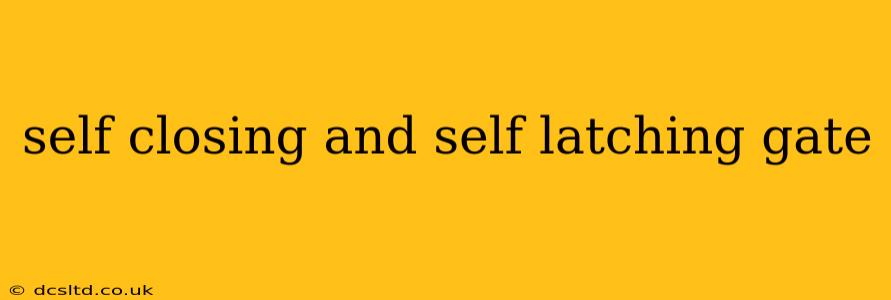Choosing the right gate for your property is crucial for safety and security. Self-closing and self-latching gates offer a significant advantage over standard gates, enhancing security and reducing the risk of accidents, especially for children and pets. This comprehensive guide will explore the differences, benefits, and considerations involved in choosing between these two types of gates.
What is a Self-Closing Gate?
A self-closing gate is designed to automatically close after being opened. This is achieved through various mechanisms, including spring-loaded hinges, gravity, or hydraulic closers. The primary benefit is enhanced security, as the gate automatically closes, preventing unauthorized access. It also helps to prevent accidental entry, particularly beneficial for young children and pets. The closing speed can often be adjusted to prevent slamming.
What is a Self-Latching Gate?
A self-latching gate automatically latches when closed. This ensures that the gate remains securely closed and locked, adding an extra layer of security. The latching mechanism can be a simple spring-loaded bolt or a more sophisticated locking system. Combined with a self-closing mechanism, a self-latching gate provides exceptional security.
What are the Benefits of Self-Closing and Self-Latching Gates?
The combined benefits of a self-closing and self-latching gate are considerable:
- Enhanced Security: The automatic closing and latching significantly deter intruders and prevent unauthorized access.
- Improved Safety: These gates minimize the risk of accidents, particularly for children and pets who might leave a gate open.
- Convenience: You don't have to remember to close and latch the gate, reducing the risk of forgetting.
- Increased Property Value: The added security and convenience can increase the value of your property.
What are the Different Types of Self-Closing Mechanisms?
Several mechanisms facilitate self-closing gates:
- Spring Hinges: These hinges use a spring to provide the closing force. They're generally simpler and more affordable.
- Hydraulic Closers: These provide a more controlled closing action, preventing slamming and potentially extending the gate's lifespan. They are typically more expensive than spring hinges.
- Gravity: For gates on an incline, gravity itself can contribute to self-closing. However, this alone usually isn't sufficient and should be supplemented with other mechanisms.
What are the Different Types of Self-Latching Mechanisms?
Self-latching mechanisms also vary:
- Spring Bolts: These simple bolts automatically engage when the gate closes.
- Magnetic Latches: These offer a quiet and smooth latching action.
- Deadbolt Latches: For higher security, a deadbolt latch provides a more robust locking mechanism.
How Much Do Self-Closing and Self-Latching Gates Cost?
The cost of self-closing and self-latching gates varies greatly depending on several factors, including:
- Gate Material: Wood, metal, and vinyl gates have different price points.
- Size and Weight of the Gate: Larger and heavier gates require more robust mechanisms, increasing the cost.
- Type of Closing and Latching Mechanisms: Hydraulic closers and sophisticated latches are generally more expensive.
- Installation: Professional installation can add significantly to the overall cost.
It's best to obtain quotes from multiple gate installers to compare prices and ensure you get the best value for your needs.
Are Self-Closing and Self-Latching Gates Required by Law?
Building codes and regulations regarding self-closing and self-latching gates vary depending on location and the specific application. For instance, many areas have regulations requiring self-closing gates for pool enclosures to enhance child safety. Always check with your local authorities to determine any relevant regulations.
How Do I Choose the Right Gate for My Needs?
Consider these factors when choosing a self-closing and self-latching gate:
- Security Needs: Determine the level of security you require.
- Budget: Set a realistic budget to guide your choices.
- Gate Material: Choose a material appropriate for your climate and aesthetic preferences.
- Size and Weight of the Gate: Ensure the chosen mechanism can handle the weight of the gate effectively.
- Maintenance: Consider the maintenance requirements of different mechanisms.
By carefully considering these factors, you can select a self-closing and self-latching gate that meets your specific needs and enhances both the security and safety of your property. Remember to consult with a professional installer to ensure proper installation and optimal functionality.
